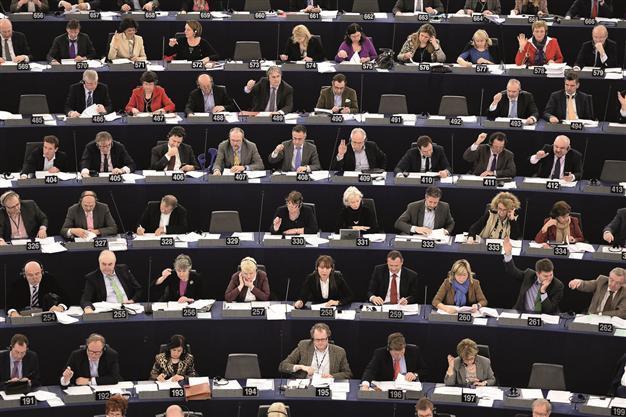EU progress report express 'deep concern' over graft claims
STRASBOURG – Hürriyet Daily News

The report was passed by 475 votes to 153, with 43 abstentions.
The European Union has voiced “deep concern” over graft and corruption allegations in Turkey in its progress report for 2013, which was approved yesterday.Members of the European Parliament expressed “deep concern at recent allegations of high-level corruption in Turkey” and stressed that “constitutional reform must remain the top priority for its modernization and democratization,” in the report, which passed by 475 votes to 153, with 43 abstentions.
The EU was referring to a massive corruption probe opened on Dec. 17, 2013, and includes corruption and bribery claims against high-profile politicians, including four former ministers, and businessmen.
The EU also criticized the Turkish government’s moves after the graft probe such as the removal and shifting of hundreds of police officers and judiciary members from their posts as a reaction to the probe.
“The resolution regrets the removal of the prosecutors and police officers in charge of the original high-level corruption investigations, stressing that this goes against the fundamental principle of an independent judiciary. An impartial and independent judiciary is vital to a truly democratic state,” European Parliament members said in their statement.
The European Parliament also said the country’s negotiations with the EU must continue to “provide a clear framework for Turkey’s reforms,” in their assessment of Turkey’s 2013 progress report, according to the statement released on the Parliament’s website yesterday.
“Turkey has embarked on reform for the benefit of its own citizens. Recent developments in the area of fundamental freedoms, independence of the judiciary, freedom of expression and others are, however, a cause of grave concern for us. We now need a serious, constructive dialogue with Turkey on these subjects and Turkey needs to show true commitment to its European aspirations and to the values upon which the EU is founded,” said EU rapporteur on Turkey Ria Oomen-Ruijten.
A draft law on the High Council of Judges and Prosecutors (HSYK) and a draft Internet law, which are seen as “restricting fundamental freedoms, take Turkey away from meeting the Copenhagen criteria for EU accession,” said the European Parliament. “They ask the European Council to make efforts to open accession negotiating chapters 23 and 24, on judiciary and fundamental rights and on justice and home affairs.”
The EU also voiced worries about political polarization in Turkey and “the unreadiness of the government and the opposition to build consensus on key reforms and draft a new Constitution.”
The EU also referred to the Gezi Park protests in the country as a reflection of “the legitimate aspirations of many Turkish citizens for deeper democracy.”
The European Parliament asks the Turkish authorities to promote tolerance and guarantee freedom of religion and belief and freedom of assembly for all. It said it also encouraged the Turkish authorities to undertake the reforms needed to promote social, cultural and economic rights of the Kurdish people.
The Parliament welcomed the joint declaration by the leaders of the two communities on Cyprus on re-launching the reunification talks. It demanded Turkey actively support these negotiations for “a fair, comprehensive and viable settlement.”
On March 11, EU Enlargement Commissioner Stefan Füle said the debate in the European Parliament over Turkey’s Progress Report showed that Turkey was losing its supporters. “Reflection and follow-up in Ankara is needed to reverse this trend,” said Füle during the debate over Turkey’s report a day before it was voted on.
















